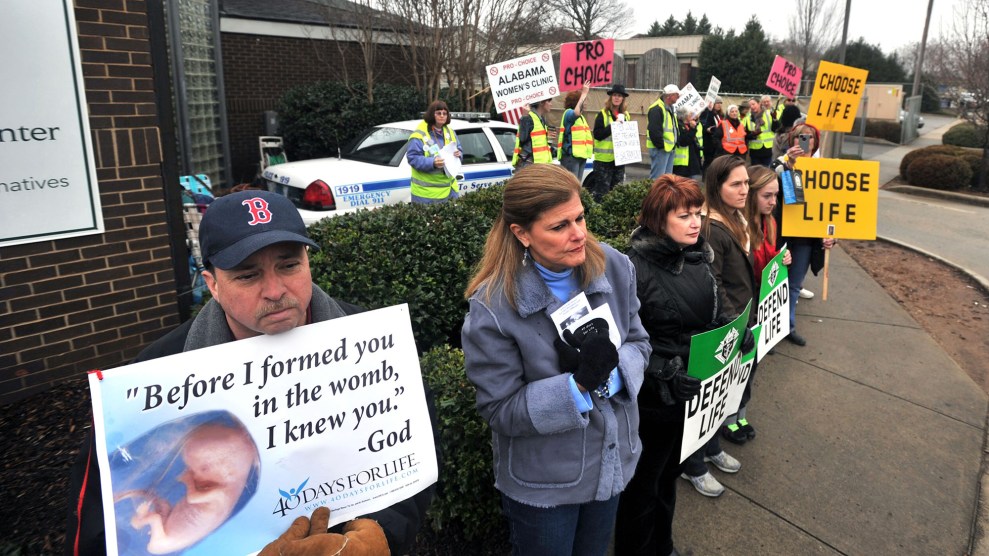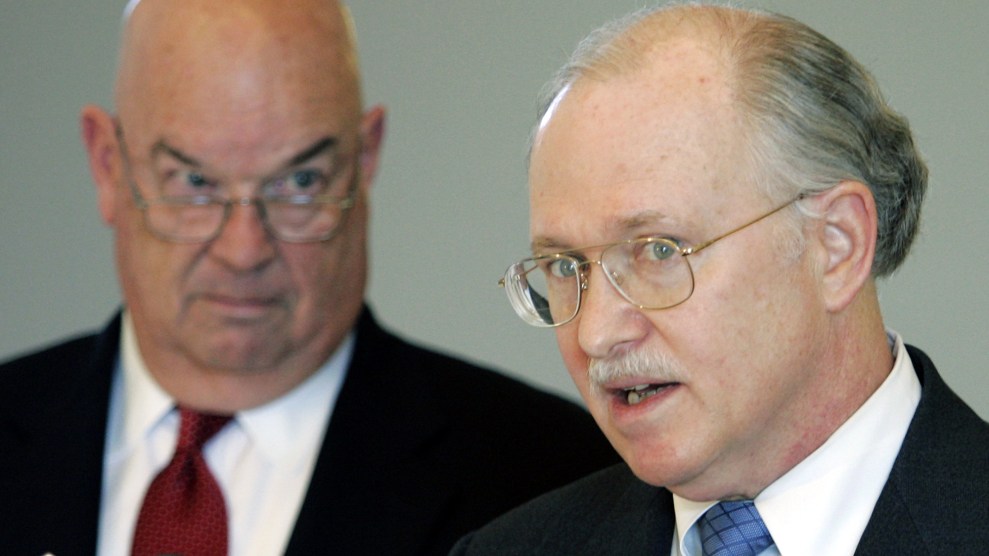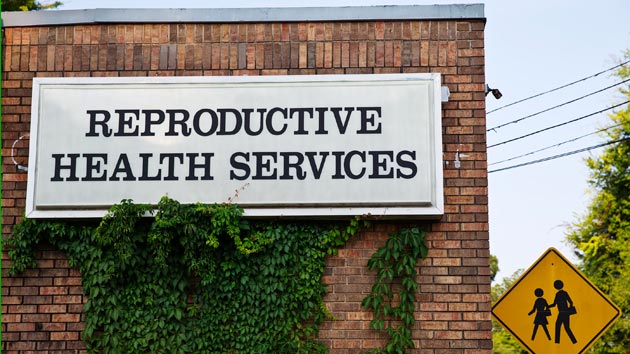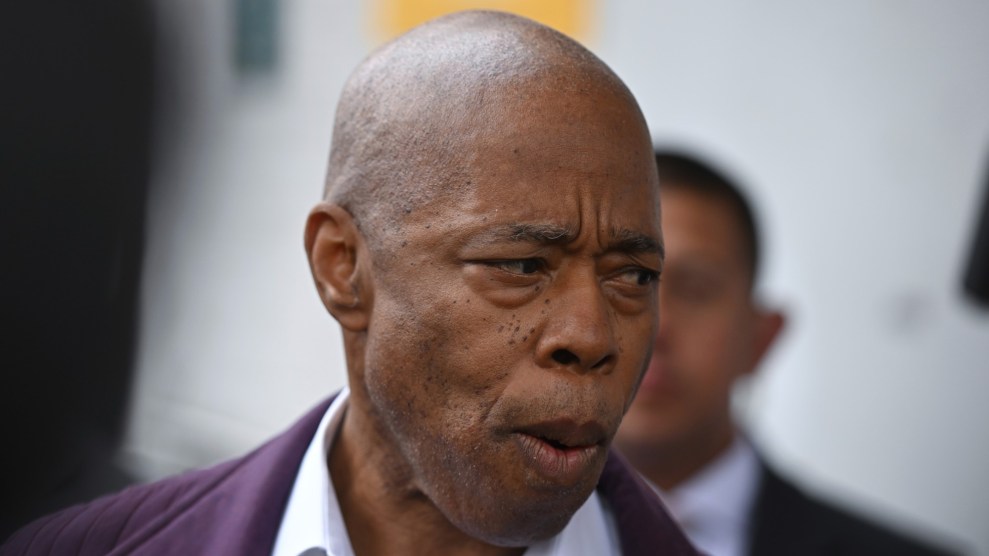
People supporting and opposing abortion demonstrate outside of the Alabama Women's Center for Reproductive Alternatives in Huntsville, Alabama, on February 23, 2013, during a 40 Days of Life prayer vigil. Sarah Cole/AP
In August 2017, I visited the Alabama Women’s Center in Huntsville, Alabama, and Dr. Yashica Robinson, an abortion provider there. The clinic was facing the latest in a never-ending series of attacks on its work—a law had passed the year prior to regulate abortion clinics like sex offenders, requiring them to be located at least 2,000 feet from public schools serving children of elementary to middle school age. A judge had issued a preliminary injunction against it, but it had not been formally ruled on, leaving the possibility of a new costly disaster hanging over the clinic.
It was particularly daunting given that a few years prior, a Targeted Regulation of Abortion Providers law, commonly known as a TRAP law, passed and required an overhaul of the clinic. Its building at the time could not be retrofitted to align with the measures required by the law—widening doorframes and corridors to accommodate ambulance gurneys, maintaining standard operating rooms and a supply of medicine that is more relevant to surgeries than abortion care—so the Alabama Women’s Center was forced to close its doors for nearly four months in 2014 while it moved to a new building. That new building, of course, was located across the street from a school.
While the law about clinics near schools was declared unconstitutional a few months after my visit, Robinson and her colleagues at the time were focused on forging ahead. “I just do it; I don’t know any different,” Robinson told me then. “The only other thing to do would be to give up and walk away, and I’m just not built that way. I believe in the work that I do. For that reason, I will continue to fight and do the best that I can; I’ve made the decision that I’m willing to do what it takes.”
The clinic and its work are now being tested again, after an Alabama probate judge agreed last week to recognize an aborted fetus as a person with legal rights in response to a wrongful death lawsuit. The suit was filed by a man who says his girlfriend terminated a pregnancy against his wishes.
The decree now paves the way for Ryan Magers, the plaintiff, to sue the Alabama Women’s Clinic, where his former girlfriend received abortion care, as well as the pharmaceutical company that produces the medication that terminated the pregnancy. Magers’ attorney Brett Helms celebrated the judge’s decision as an unprecedented victory—”the first of its kind, ever,” he boasted. Helms also told local television station WAAY that he believes this case will be taken up to the state supreme court.
Andrew Beck, a lawyer with the ACLU who has represented the Alabama Women’s Clinic in past legal proceedings, is skeptical the case will get that far. He stresses that this is just a preliminary order issued by a probate judge—and the case itself will play out in state court, not probate court, which is merely where estates are settled. (As Imani Gandy points out in Rewire, Alabama law dictates that family members of a deceased person cannot bring a wrongful death suit—”only the personal representative of the deceased person’s estate can sue for the ‘wrongful act, omission, or negligence’ that caused the person’s death.” Probate Judge Frank Barger’s ruling effectively recognizes Magers as such a representative.)
Beck argues the lawsuit is essentially a frivolous attempt to challenge a woman’s right to abortion care: “It is an attempt to get around fundamental protections in our country’s abortion law and to undermine a woman’s right to get an abortion and both interfere with the woman and to harass and intimidate providers.”
The Alabama Women’s Clinic has until April 1 to file an answer to the complaint in state court or file a motion to dismiss.
According to the court filing, Magers “repeatedly pleaded” with his girlfriend, who was 16 at the time, not to terminate the pregnancy. Magers was 19 and unemployed, according to the girl’s father, who spoke with the Washington Post. “I knew he was pressuring my daughter to have sex, and I can’t believe we are here now,” said the father, who spoke on condition of anonymity.
Mary Ziegler, a professor at Florida State University College of Law who specializes in reproduction, family, sexuality, and the Constitution, says the case reminds her of another from 1988, Conn v. Conn, in which an Indiana man filed an injunction to prevent his wife from obtaining an abortion. The circuit court granted the injunction, then the state supreme court reversed it. The decision was appealed to the US Supreme Court, which unanimously declined to take it on.
“The [Supreme] Court has been particularly hostile to efforts to recognize rights for fathers pre-birth to block abortions,” Ziegler notes. “There’s a sort of, ‘throw it at the wall and see what sticks’ approach to anti-abortion strategy right now, but I would be surprised if bigger groups got behind this because it hasn’t worked in the past.”
What’s more, Ziegler doubts that the personhood approach could withstand a routine legal challenge—overturning precedent set by landmark cases like Roe, she argues, would be extremely difficult at the Supreme Court level, even given its current makeup. In Roe, the state of Texas tried to argue personhood by saying that legal abortion was unconstitutional; essentially, the unborn were being deprived of due process and equal protection. But because no one can agree on when exactly life begins, the Court ruled that Texas doesn’t have the authority to impose its concept of life on anyone. That makes it even more unlikely that precedent will be felled with this specific approach, Ziegler notes.
“The kind of mainstream conservative jurisprudential position has been to say that there is no abortion right, not that there is a right to life,” Ziegler says. “Recognizing a right to life would open up potentially a lot of interesting but challenging jurisprudential questions; anytime you recognize a new fundamental right or liberty interest, that can have unintended consequences, so even judges who want to overturn Roe yesterday might not want to use this as a vehicle for doing so.”
All this doesn’t seem likely to deter Magers’ legal team, which features a cast of characters who have dedicated years to a strategy based on personhood. For example, Personhood Alabama, a nonprofit that describes its mission as “ensuring the legal recognition of the personhood of the unborn through legislation, litigation, and education,” is supporting the case. Then there’s Samuel McClure, who, in addition to Helms, is listed as representation in the lawsuit.
McClure ran for state attorney general in 2017, though he dropped out of the race after just a few months. The first issue of concern he listed on his campaign website was “Prosecute Abortionists Who Profit From Killing Children.” As a candidate, McClure claimed he had been a “sidewalk counselor” outside the Montgomery abortion clinic since 2012 (though a staff member of the clinic told Rewire that he was a “brand new” addition to the anti-abortion protesters). In a Facebook Live video to his followers during the campaign, he declared that his job as attorney general would be to make life “hell on earth” for abortion providers. Finally, when he addressed the Alabama Constitution Party’s summer meeting in 2017, he argued that a state militia should be used to defend a policy that essentially defies federal law and outlaws abortion.
McClure has also been involved in other “personhood” initiatives in Alabama. He says he pushed for “Proposal 16” in 2017, which was an attempt to assert the federal government has no authority to legalize abortion, and asked Republican Gov. Kay Ivey to issue an executive order that redefined a person as “a human being, including an unborn child in utero at any stage of development, regardless of viability,” according to Rewire. (The effort was unsuccessful.)
The lawyer was also the counsel of record on a 2012 petition for writ of certiorari, which asks the US Supreme Court to request the lower court send up its records of the case for review, in support of a personhood ballot initiative in Oklahoma. It was struck down by the state supreme court and appealed up to the US Supreme Court, which declined to take it on. (Another name on the petition—which lists verses from the Bible under the section labeled “Other Authorities”—is Roy Moore, the Republican who lost his 2017 Senate bid following allegations of sexual misconduct by nine women, some of whom were allegedly minors at the time of the incidents.)
Alabama is one of the most staunchly anti-abortion states in the country. Last year, 59 percent of voters approved an amendment to the state constitution that declares “it is the public policy of this state to recognize and support the sanctity of unborn life and the rights of unborn children, most importantly the right to life in all manners and measures appropriate and lawful; and to provide that the constitution of this state does not protect the right to abortion or require the funding of abortion.” The amendment doesn’t have much power in the present day, but it does open the door to more extreme abortion restrictions should Roe be overturned in the future.
The state also bans abortions after 22 weeks, and the use of telemedicine for abortion care. According to state law, the teenager at the center of this case had to undergo an ultrasound and receive state-directed counseling, which often contains incorrect or misleading information about the procedure; the fetus is referred to as an “unborn child” and death is listed as a potential complication without specifying that it is extremely rare—women are more likely to die in childbirth than they are from abortion-related complications. An analysis by Broadly found that 18.8 percent of the fetal development statements made in Alabama’s counseling booklet are inaccurate. After all that, the teenager would have had to wait 48 hours before she could get the procedure.
The clinic in Huntsville is one of only three abortion clinics left in Alabama. The South has some of the largest “abortion deserts”—defined as major cities with populations over 50,000 where residents would have to travel 100 miles or more to get an abortion—in the country, according to a study in the Journal for Medical Internet Research.
While the case has been gaining national attention over the past week for its surprising pairing of the personhood strategy with a fatherhood claim, Beck still cautions against making too much of it. “It’s unusual because it’s unconstitutional,” he says. “I actually think the legal principle is quite straightforward.” He also points out that it’s important to view this case within the context of the organized attack on abortion rights that has been going on for years in the state.
Thinking about the potential for the case to just be dismissed, but also about the chaos it will likely create in the meantime, reminded me of when Robinson showed me a closet in the clinic that was stocked with medication. Well-organized and neat, its contents were required by the TRAP law to adhere to ambulatory surgical center standards. She explained to me that the medicine never gets used because the clinic doesn’t perform surgeries, and she felt it was mostly an expensive waste that had to be restocked as the medicine expires. It struck me then, as it does now, that so many people seem more concerned with flashy cases that can make a frightening headline than the insidious, steady march to drain abortion clinics of their resources.

















